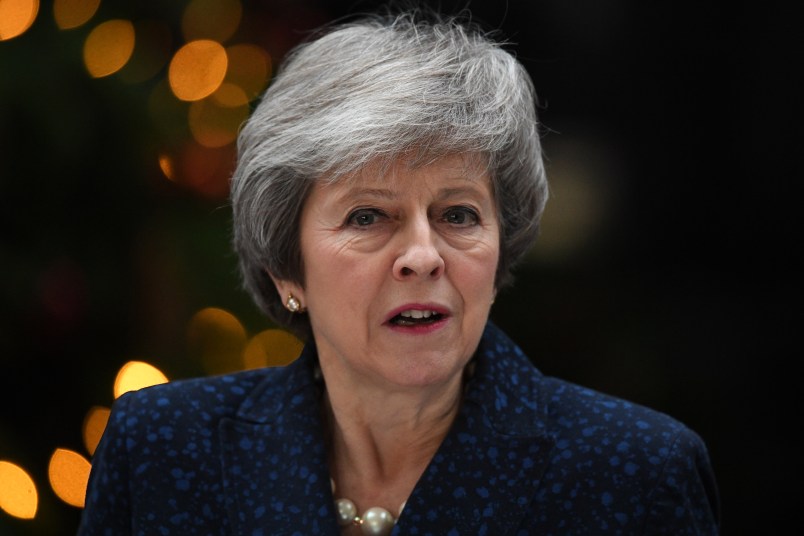LONDON (AP) — British Prime Minister Theresa May urged lawmakers Thursday to spend the upcoming Easter break to “reflect” on the need for a Brexit compromise, after a clearly frustrated European Union gave the country six more months to find a way to leave the bloc.
She said doing so and passing an EU withdrawal agreement quickly would allow Britain to avoid taking part in European parliamentary elections set for late May, an unpalatable prospect to many, particularly in her Conservative Party.
May was addressing lawmakers just hours after returning from a special summit in Brussels at which the other 27 EU leaders delayed Britain’s scheduled departure from the bloc from this Friday to Oct. 31.
Given that Britain’s fractious Parliament has rejected her Brexit withdrawal deal with the EU on three occasions this year, her hopes for a quick resolution could rest in large part on whether her Conservative Party-led government can find common ground with the opposition Labour Party.
The talks, which both sides call serious and constructive, are expected to continue in the coming week.
Speaking after May, the usually combative Labour leader Jeremy Corbyn said he welcomes indications that the government may be altering some of its long-held policies and specifically called for movement on the key issue of remaining in a customs union with the EU after Brexit.
“The government will have to compromise,” he said, warning that any agreement would have to be entrenched because Labour has no idea who will replace May.
Without support from the Labour Party, May’s path toward actually taking Britain out of the EU remains unclear.
She is blocked by a strong faction in her own Conservative Party that hates her withdrawal deal and hopes to oust her.
May’s own authority has been gravely compromised by the long Brexit ordeal and she has promised to step down once Britain leaves the bloc — if efforts to get rid of her more quickly do not bear fruit.
Many in the left-wing Labour Party fear that May, who has indicated she will depart once Brexit is achieved, will be replaced by a staunch Brexiteer like Boris Johnson, the former foreign secretary.
Faced with so much uncertainty, EU leaders whose talks went well after midnight, agreed on the Halloween cutoff date.
If no extension had been granted, then Britain faced the prospect of crashing out of the EU this Friday with no deal, a scenario that in Parliament worry would lead to a deep recession as tariffs are slapped on U.K. exports and other restrictions on trade are imposed.
“Please, do not waste this time,” European Council President Donald Tusk pleaded. He said the EU was giving Britain six more months “to find the best possible solution” to its Brexit impasse.
Like many things Brexit-related, the extension was a compromise. May came to the summit in Brussels seeking a delay to June 30. Some European leaders favored a longer extension, but French President Emmanuel Macron was wary of anything than a very short delay. May spoke to EU leaders for just over an hour, before they deliberated among themselves.
Tusk said that during the extension Britain “will continue its sincere cooperation as a full member state, with all its rights, and as a close friend and trusted ally in the future.”
This is the second delay to Brexit. Originally set for March 29, May sought an extension after Parliament’s constant rejections. The EU gave Britain until this Friday to approve a withdrawal plan, change course, seek a further delay to Brexit, or crash out of the EU with no deal to cushion the shock.
The Confederation of British Industry said the Brexit extension means an “imminent economic crisis” has been averted for now.
Pro-EU politicians said the next few months should be used to hold a new referendum on whether to leave the EU or remain. Scottish National Party Nicola Sturgeon said in a tweet after the extension was granted that the British people should be allowed to “decide if they still want to leave.”
Irish Prime Minister Leo Varadkar said the time had come for Britain to decide what it wants.
“We’re giving them a very long time to take a decision,” he said.
“You know, the European Union is not a prison. Nobody has to stay but it is also a home and we are not going to kick anyone out.”
___
Associated Press writers Raf Casert, Jill Lawless, Mike Corder and Angela Charlton in Brussels. Danica Kirka in London, and Sylvie Corbet in Paris contributed to this report.
___
Follow AP’s full coverage of Brexit at: https://www.apnews.com/Brexit







Six months will go by faster than Theresa May can say “%^#$$#.”
Six months from now… Theresa May who?
So the British need to participate in the May European Parliament elections now, right? What a clusterfuck.
I’ll bet you all a shiny internet nickel that Brexit D-Day will now never come.
It seems like it’s been obvious for some time.
Nobody actually seems to want it to happen. Including the people driving the double-decker bus. They just don’t want to admit it.
She wont make it past May.